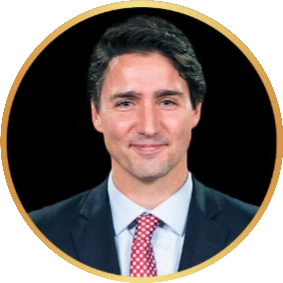
Justin Trudeau
Justin Pierre James Trudeau is a Canadian politician who is the 23rd and current prime minister of Canada. He has served as the prime minister of Canada since 2015 and as the leader of the Liberal Party since 2013. Trudeau is the second-youngest prime minister in Canadian history after Joe Clark.
Born in Ottawa, Trudeau attended Collège Jean-de-Brébeuf, graduated from McGill University in 1994 with a Bachelor of Arts degree in literature, then in 1998 acquired a Bachelor of Education degree from the University of British Columbia. After graduating he taught at the secondary school level in Vancouver, before relocating back to Montreal in 2002 to further his studies. He was chair for the youth charity Katimavik and director of the not-for-profit Canadian Avalanche Association. In 2006, he was appointed as chair of the Liberal Party's Task Force on Youth Renewal.
In the 2008 federal election, he was elected to represent the riding of Papineau in the House of Commons. He was the Liberal Party's Official Opposition critic for youth and multiculturalism in 2009, and the following year he became critic for citizenship and immigration. In 2011, he was appointed as a critic for secondary education and sport. Trudeau won the leadership of the Liberal Party in April 2013 and led his party to victory in the 2015 federal election, moving the third-placed Liberals from 36 seats to 184 seats, the largest-ever numerical increase by a party in a Canadian federal election.
Major government initiatives he undertook during his first term as prime minister included legalizing recreational marijuana through the Cannabis Act; attempting Senate appointment reform by establishing the Independent Advisory Board for Senate Appointments and establishing the federal carbon tax. In foreign policy, Trudeau's government negotiated trade deals such as the Canada-United States-Mexico Agreement (CUSMA) and the Comprehensive and Progressive Agreement for Trans-Pacific Partnership, and signed the Paris Agreement on climate change. He was sanctioned by Canada's ethics commissioner for violating conflict of interest rules regarding the Aga Khan affair, and later again with the SNC-Lavalin affair.
Trudeau led the Liberals to consecutive minority governments in the 2019 and 2021 federal elections, during which his government has responded to the COVID-19 pandemic. During his second term he announced an "assault-style" weapons ban in response to the 2020 Nova Scotia attacks. He was investigated for a third time by the ethics commissioner for his part in the WE Charity scandal, but was cleared of wrongdoing. In 2022, he invoked the Emergencies Act in response to the Freedom Convoy protests, the first time the act was brought into force since it was enacted in 1988.
Trudeau supported the Liberal Party from a young age, offering his support to party leader John Turner in the 1988 federal election. Two years later, he defended Canadian federalism at a student event at the Collège Jean-de-Brébeuf, which he attended.
Following his father's death, Trudeau became more involved with the Liberal Party throughout the 2000s. Along with Olympian Charmaine Crooks, he co-hosted a tribute to outgoing prime minister Jean Chrétien at the party's 2003 leadership convention, and was appointed to chair a task force on youth renewal after the party's defeat in the 2006 federal election.

